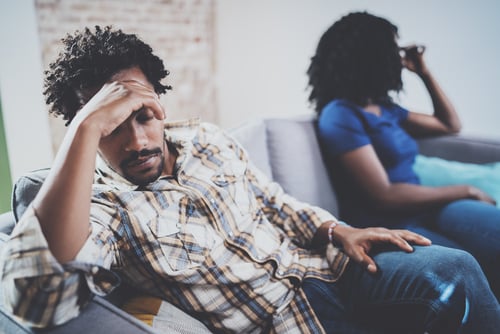Finding and maintaining relationships can be challenging. But what happens when the relationship you’re in begins to look like the previous one?
Have you ever reflected on why you are attracted to the same type of person, over and over again?
Studies show that we are attracted to what is familiar as a result of our adopted childhood love styles. This means we are attracted to familiar people even if we know they may be bad for us. This is known as the familiarity principle.
If you are struggling to maintain healthy intimate relationships or need help getting out of an addictive relationship, reaching out to a professional relationship coach online may give you the relief you seek.
Read on to find out why you may tend to seek similar relationships in your life.
What Is The Familiarity Principle?

We all gravitate to what’s familiar to us. That often means we are drawn to people who inadvertently cause us to feel pain repeatedly.
For example, children who were abused growing up may be drawn to abusive relationships. Why? Because they are familiar with abuse.
This is the familiarity principle. Simply stated, we are unconsciously drawn towards what is most familiar.
How Does Your Family Shape Your Personality?
Good or bad, the environment we grew up in is the only one we’ve ever known. That is why it’s difficult for people to leave painful relationships.
Even when their behavior is hurtful, you may find comfort in the familiarity of that behavior. Worse still, it’s hard to leave that relationship because you are bound to the past.
In my case, I was drawn to save others but not myself. This started because my dad drowned when I was an infant, and mom became an alcoholic. I failed to save her, and she died.
So, I became codependent with my friends and family. I started saving everyone else because it felt good. I had a purpose. But this was often at my own expense. I didn’t realize what I was doing until someone helped me see that I was codependent in my relationships.
How The Familiarity Principle Can Affect You
While you may want a do-over in life, it can often have a negative effect, unless the corrective experience is supported and healthy. Unfortunately, if you don’t choose to do better with intentionality, then you’ll end up doing something that will hurt you.
Imagine you want to get into a relationship with a person that you like. But they are clearly unavailable. However, instead of not pursuing the relationship, you’re drawn to them even more because there is something about them being unavailable that feels familiar to you.
What’s more, it’s this feeling of familiarity that makes you pursue them even harder.
However, consider this. If a repeated action prompted by old familiar feelings hasn’t worked previously, why would it work now? The truth is it won’t.
The Dangers Of The Familiarity Principle
Any action that hasn’t served you in the past may only work as temporary pain relief. And this can lead to unwanted consequences. Such as:
- Lashing out at a loved one
- Hiding your feelings from a partner
- Binge eating for three days straight
- Getting drunk again
- Running to the next fling
If you find yourself repeatedly returning to actions that haven’t served you in the past, then I encourage you to do something different. Sit with your feelings, no matter how uncomfortable they are. And take a moment to recognize why the feeling is there.
Most importantly, focus on why this situation is different from the situation in the past that gave you the original wound.
How To Break Free From The Power Of Familiarity
The first step is to be aware of the patterns in your relationships. Identify the type of person you are attracted to.
For example, have your past partners been controlling? Have they always told you what to do, when, where, and how? Now think back to your childhood. Was someone you grew up with controlling as well? Once you become aware, then you can break out of the old pattern.
The next step is to own your feelings. Even if they are uncomfortable, sit with your feelings. Don’t hide from them or avoid them. Acknowledge how you feel. This will help you manage and tolerate uncomfortable feelings and start to heal past wounds.
The final step is to process the pain and live in relational freedom. This is where you can heal yourself without hurting people around you.
How Do You Deal With Painful Relationships?
Today, when a relationship or friendship ends, I sit with my feelings. And I know that whatever is happening is not because my dad drowned, or my mom died. I know the person is leaving because they want to, need to, or because they have their own wounds to heal.
It doesn’t mean that you won’t sometimes hurt like hell. It doesn’t mean you won’t feel intense, uncontrollable feelings again. It doesn’t mean you shouldn’t try to repair the relationship if it is worth saving.
The good news is the choice is yours. Either you can:
- Feed the negative feelings and experience an old pattern of actions that don’t work, or:
- Experience the feeling, understand it, then choose an action that isn’t hurtful to you or others.
If you choose the second option, then you can start to heal and experience relational freedom. This will help you have healthy relationships with yourself and others because you are worthy of love, happiness, and a healthy relationship.
Find Freedom With The Help Of A Remote Relationship Coach

Moving away from familiar patterns and healing wounds is a lengthy and often challenging process. That’s why we recommend that you seek support from professionals. At PIVOT, we offer expertise-based online relationship coaching for individuals and couples, as well as transformative relationship building-skills workshops and retreats.
If you are ready to create meaningful connections and overcome feeling emotional numbness, then contact PIVOT today and find balance in your emotional life.

